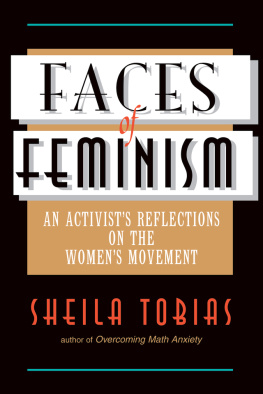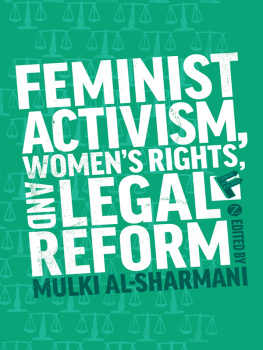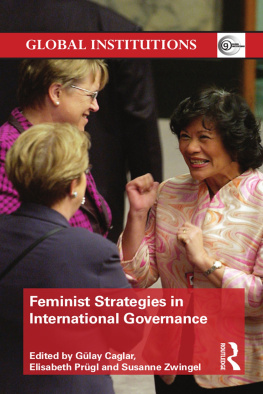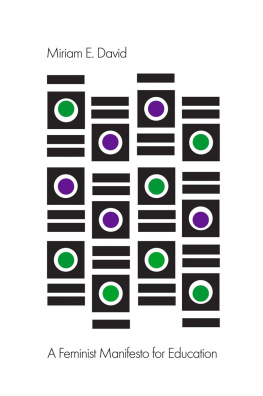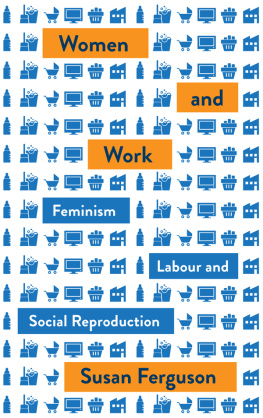Published by Louisiana State University Press
Copyright 2018 by Louisiana State University Press
All rights reserved
Manufactured in the United States of America
First printing
DESIGNER: Michelle A. Neustrom
TYPEFACE: Cassia
PRINTER AND BINDER: Sheridan Books, Inc.
LIBRARY OF CONGRESS CATALOGING-IN-PUBLICATION DATA
Names: Shockley, Megan Taylor, author.
Title: Creating a progressive commonwealth : women activists, feminism, and the politics of social change in Virginia, 1970s2000s / Megan Taylor Shockley.
Other titles: Making the modern South.
Description: Baton Rouge : Louisiana State University Press, [2018] | Series: Making the modern South | Includes bibliographical references and index.
Identifiers: LCCN 2018018057| ISBN 9780807169360 (cloth : alk. paper) | ISBN 978-0-8071-7031-1 (pdf) | ISBN 978-0-8071-7032-8 (epub)
Subjects: LCSH: FeministsVirginiaHistory. | FeminismVirginiaHistory. | Womens rightsVirginiaHistory.
Classification: LCC HQ1438.V8 S56 2018 | DDC 305.4209755dc23
LC record available at https://lccn.loc.gov/2018018057
The paper in this book meets the guidelines for permanence and durability of the Committee on Production Guidelines for Book Longevity of the Council on Library Resources.

ACKNOWLEDGMENTS
This is the book I needed to write, although I did not know it when I embarked on the study. The project grew out of the collaborative effort Cindy Kierner, Jennifer Loux, and I undertook for the Library of Virginia to look at Virginia history through a gendered lens. It was then that I understood just how much of my work and my career as a professional historian has been made possible by the feminist activists who fought to change the commonwealth in the late twentieth century. A few pages dedicated to these women in the larger work did not do them justice, and so I determined to write a book about them and the issues for which they fought. While they did not succeed on every level, and they were not without their own prejudices and shortcomings, feminist activists made Virginia a better place, and helped to move the South forward on womens issues.
This book is truly a collaborative effort. I could not have written it without the assistance of many feminists, both activists and academics. First, I must thank the women who took time out of their busy lives to meet with me, share their inspirational stories about how they lived and how they worked to better the lives of Virginia women. These self-defined feminists, all listed by name in the Works Cited section and quoted extensively throughout the book, represent, to me, the heroes of Virginia. They spent countless hours, used their own money and raised more from others, and sacrificed work and sometimes family time to fight for womens rights in the commonwealth. It is to them that I dedicate this book. I am so grateful not just for the time I was privileged to spend with them, but also for the work they did to make Virginia womens lives immeasurably better. Their stories are archived as transcripts and digital recordings at Virginia Commonwealth University (VCU) in the Virginia Feminist Oral History Project. They graciously allowed open access so other scholars can make use of their stories.
I have been fortunate to have worked with fantastic archivists and public historians throughout the commonwealth. Though its hard to believe, I have been working at VCUs Special Collections on various projects for over twenty years. Through all of that time and to this day I count on Ray Bonis. From making sure collections were processed in time for my use, to pointing out and allowing me access to unprocessed records or records currently being reprocessed, he has been unfailing in his support of my work. I am lucky to be able to work with Ray; Wesley Chenault, director of VCU Special Collections; and Yuki Hibben, assistant director, as well as Laura Muskavitch, archivist, who have been collaborators in the feminist oral history project. Thanks, too, to Cindy Jackson, comic arts specialist, for always being ready to assist and answer questions! I have also been privileged to work at the Library of Virginia for two decades with some wonderful people. They have patiently listened to all of my stories, pointed me in some important directions, and made collections available to me. I value so much the time I have spent with Sandra Treadway, Mari Julienne, Gregg Kimball, Brent Tarter, Mary Dean Carter, and all the editors and archivists Ive been associated with through my work at the LVA. A special thank you goes to Jessica Tyree, who worked tirelessly to process the voluminous National Organization of WomenVirginia Chapter records for me. Mona Farrow at Old Dominion University came in early and stayed late just so I could have more access to records, and both she and Mel Frizzell made my research in the Tidewater much easier. Christine Cheng at George Masons Special Collections and Marc Brodsky at Virginia Techs Special Collections, as well as the archivists at the College of William and Mary, also went out of their way to assist me in securing access to materials in a timely and efficient fashion, working around my oral history schedule. If you have not gathered as much, there is a wealth of manuscript sources on Virginia womens activism, and my book can only address a few of the critical issues I researched for many years. It is my hope that other scholars will avail themselves of these sources and continue to work on this vital history.
I received material support from many sources to assist in the production of this book as well. From professional development grants for travel, to a University Research Completion Grant that paid for transcriptions and other related costs, Clemson University provided considerable financial backing for my work. I received a Guy Kinman Fellowship from the Virginia Museum of History and Culture that enabled me to work in their collection of LGBT-related publications and records. The Clemson MA students including John Gause, Clelly Johnson, Patrick Kent, Connie Wallace, and Brett Zeggil volunteered their transcription services, for which I am grateful. My team of transcribers also included Bea Burton, Elaine Bowen Fowler, and Matt Gottlieb, whose work made this book possible. In addition, Dana Friedman McGuire, Kevin McGuire, and their family, as well as Shu Wang and Todd Holland and their family, in Montgomery County, hosted me while I conducted interviews in the New River Valley and parts west.
As with all collaborative efforts, this work benefited from the support of many. I have always profited from the many panels and conversations with other researchers in post-1945 feminism including Nancy Baker, Sandra Treadway, and LaShonda Mims. Janet Allured has been a constant friend and colleague, offering guidance, support, and a deeply thoughtful reading of my first draft. Her comments have made this work immeasurably better. Marjorie Spruill also read a draft and provided tremendous assistance in helping me contextualize the movement within larger social forces. David Goldfield read the manuscript and offered excellent suggestions for revision. I also want to thank those who read the final copy of the manuscript and often helped to clarify details, including Lee Perkins, Emily McCoy, Kate McCord, Beth Marschak, Suzanne Keller, Lisa Beckman, Betsy Brinson, Denise Lee, Pat Winton, Sandra Brandt, Mary Dean Carter, Bonnie Atwood, Mary Wazlak, Karen Raschke, Georgia Fuller, Mary Coulling, Elizabeth Smith, Stephanie Tyree, and Terrie Pendleton. I am grateful for all of the readers support and advice; the book is immeasurably better because they took the time to provide feedback. My Clemson colleagues and friends have lived with this book as long as I haveStephanie Barczewski, Criss Smith, Linda Li-Bleuel, Rachel Chico Moore, Caroline Dunn Clark, Lee Wilson, Brenda Burk, and Vernon Burton in particular have helped me keep my focus on the work and my perspective on the present as the 2016 election and its subsequent headlines drew my attention and ire. Cindy Kierner has shared hotel rooms and her Fairfax home with me, and we have spent countless hours talking about our work, kids, and Jersey roots. Her pointed assessments of my work have made me a better writer through the years. I must give a special thank you to Matt Gottlieb, who has helped track down articles, kept me in the loop in terms of recent Virginia developments, and Simone Roberts, whose incredibly helpful readings of early first-chapter drafts enabled me to develop a narrative path and whose Facebook posts keep me in the loop in terms of feminist activism in the Old Dominion. I am also grateful to LSU Press, particularly editors Rand Dotson and Neal Novak, and copyeditor Stan Ivester, for their support throughout the writing and revision process.


